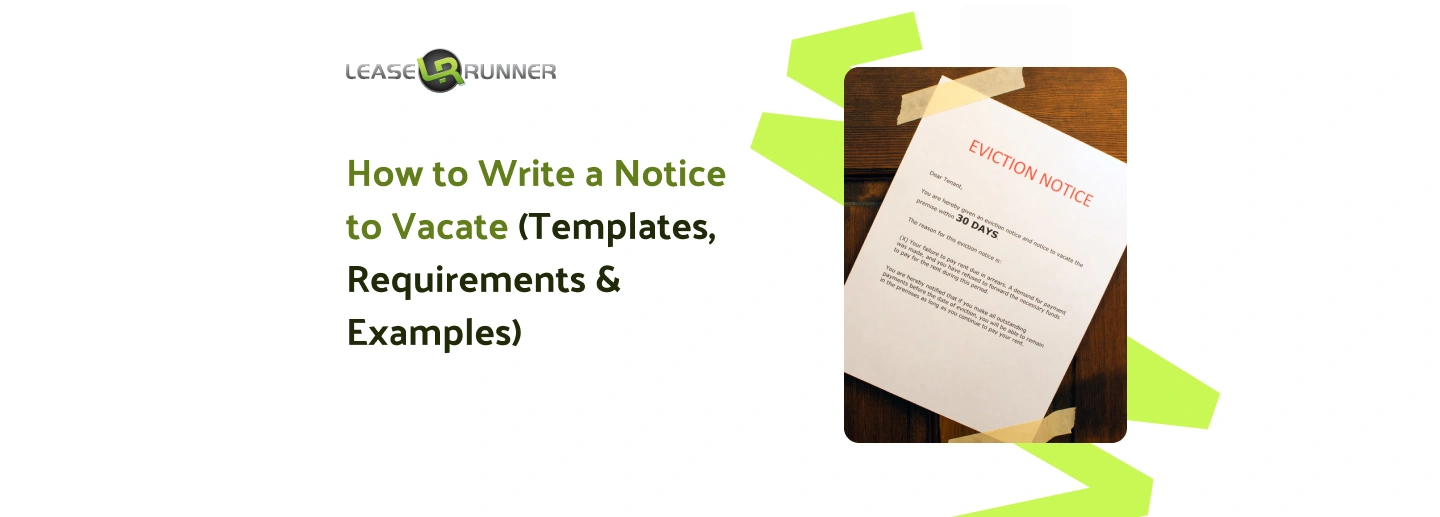
Every renter deserves a fair shot at housing, but what if your tenant screening report tells the wrong story? An eviction record, whether accurate or not, can make renting a challenge, but you don’t have to accept it as the final word. With the right steps outlined in the article, you can challenge errors, clear up misunderstandings, and improve your chances of approval!
What is an Eviction on a Tenant Screening Report?
What is an eviction?
An eviction is a process in which a landlord makes a tenant or occupant leave a rental property. This typically occurs when rent is unpaid, lease terms are breached, or significant issues arise on the property. In many cases, a judge is involved. In some cases, tenants move out on their own after receiving notice.
A tenant screening report is the file landlords read before approving new renters. It often includes credit history, rental history, court cases, and eviction records. These reports are built from public records and credit databases.
Put simply, an eviction on a tenant screening report is proof that a past removal shows up in your rental background. For landlords, this raises concerns. It suggests rental issues in the past, even if the case was dismissed or entered by mistake.

Why It’s Important to Dispute or Remove an Eviction Record?
Many renters underestimate the damage an eviction record can cause. Even one listing can make rental approval harder. Knowing how to dispute an eviction on a tenant screening report can restore your chances.
Impact of an Eviction on Future Rental Prospects
An eviction marks you as a higher-risk tenant. Landlords may deny your application outright, increase deposits, or demand co-signers. Does eviction show up on rental history checks? Yes, it often does. That means difficulties renting can last even if you improve financially afterward.
Common Errors and Inaccuracies in Eviction Listings
Not every eviction entry is correct. Screening companies sometimes misreport dismissed cases or confuse tenants with the same name. Some tenants also face wrongful eviction filings that never advanced in court. Fortunately, tenant rights eviction record protections under U.S. law let you challenge false entries.
How Long Does An Eviction Stay On Your Record?
So, how long does an eviction stay on your record? The answer is about seven years. Under the Fair Credit Reporting Act (FCRA), negative items like eviction filings cannot appear after that time.
Still, the exact period can change by state. Some states seal records earlier, while others allow landlords to view filings for the full term.
- Tenant screening reports: Most rental background checks will show an eviction for 7 years from the date it was filed.
- Public court records: If your eviction case went through the legal system, it might be visible for longer than 7 years, depending on state laws.
- Credit reports: Evictions themselves don’t appear on credit reports, but unpaid rent or court judgments related to the eviction can show up for 7 years and hurt your credit score.
Know Your Rights as a Tenant (U.S. Laws and Protections)
If you want to learn how to dispute an eviction on a tenant screening report, you first need to know your rights. In the U.S., most protections come from the Fair Credit Reporting Act (FCRA). This law sets nationwide rules on tenant rights and eviction record disputes.
Under the FCRA, you have three important rights:
- Adverse Action Notice. Under the Fair Credit Reporting Act (FCRA), an Adverse Action Notice is a formal document that a landlord must send when denying a rental application based on information from a consumer report. If a landlord denies your rental application, they must give you the reason in writing. You are also entitled to a free copy of your screening report within 60 days. This allows you to verify if the eviction on your credit report matches your rental history.
- Right to dispute errors. If you see a false entry, you can challenge it. Send a dispute to the screening company. By law, they must investigate within about 30 days. If the entry cannot be verified, it must be fixed or deleted. This offers a way to remove wrongful eviction from record listings.
- Seven-year reporting limit. The FCRA sets the eviction statute of limitations for reporting at seven years. After that, the record should not appear.
Some states give renters even stronger protections. California seals eviction records within 60 days if the tenant did not lose the case. New York stops landlords from rejecting applicants only because of an eviction filing, a practice known as “blacklisting.” Around 17 other states also passed laws sealing some records earlier.
These protections mean that evictions can be removed if they are outdated, sealed by state law, or proven false; they must come off your report. Knowing these rules is key to protecting your rental future. If you need more local insights, check our guides on DC eviction procedures and the Florida eviction process.
Preparing to Dispute an Eviction Entry

Here’s a clear, step-by-step process to fix errors and improve your chances of getting approved for housing.
Step 1: Get a Copy of Your Tenant Screening Report
Before addressing any eviction-related issues, first acquire a copy of your tenant screening report.
- Request your tenant screening report directly through LeaseRunner for precise and up-to-date eviction information.
- If you recently faced denial from a landlord or property manager, you have the right to request a free copy directly from the company that created the file under the Fair Credit Reporting Act (FCRA).
- Additionally, review your general credit reports from AnnualCreditReport.com, available for free annually
Once you have your LeaseRunner tenant screening report, examine it carefully for any eviction records or personal details inaccuracies. Even small mistakes in your name, address, or Social Security number can create problems.
The FTC recommends verifying these identity fields because misreported data may lead to false tenant rights eviction record issues. By catching both listing errors and personal info mistakes early, you protect your rental history and credit file.
LeaseRunner offers reliable, comprehensive tenant screening services, including eviction checks, credit checks, and criminal background checks, simplifying the process for tenants and landlords alike.
Step 2: Review and Identify Errors in Tenant Screening Report
When disputing an eviction, carefully check the tenant screening report for these common errors:
- Evictions that never happened: Cases dismissed in court or settled informally may still appear. This includes false or unlawful evictions.
- Eviction records, despite the tenant staying: Sometimes, evictions show on file even though the tenant never left or the case was sealed or expunged.
- Mistaken or erroneous evictions: Reports may include someone else’s eviction due to similar names or addresses.
- Old eviction records: Evictions typically drop off after seven years (eviction statute of limitations). Anything older should not be reported.
- Incorrect financial records: Settled debts may still show as unpaid, affecting credit repair after eviction.
Use this information to support your dispute and seek legal help for an eviction dispute if necessary. Understanding how long eviction affects credit and the difference between eviction on a credit report vs rental history can better prepare you. For more guidance, see resources on how to check eviction history and what can void a three-day notice.
Step 3: Gather Evidence to Support Your Claim
Once you’ve spotted an error, the next step is proving it. The more solid evidence you have, the better your chances of getting the eviction removed.
Helpful documents are:
- Court records show the eviction was dismissed or never finalized.
- Proof of rent payments if the eviction was due to unpaid rent.
- Correspondence with your landlord confirming that the issue was resolved.
- A copy of your lease agreement, if it helps prove your case.
How to Dispute an Eviction on Your Tenant Screening Report: Step-by-step guide
Landlords often rely on tenant screening services to decide who qualifies for a lease. If your screening report lists an eviction, it can be difficult to secure housing—even when the eviction record is wrong, outdated, or misleading.
Knowing how to dispute eviction on tenant screening report errors gives renters a fair chance to correct their history. This step‑by‑step guide explains the dispute process, the documents you’ll need, and what to do if your case is unsuccessful.
Step 1: Identify the Tenant Screening Company Reporting the Eviction :
The first step in a tenant screening report eviction dispute guide is finding out which screening company reported the eviction. Multiple reporting agencies exist, such as RentPrep, CoreLogic, or Experian RentBureau. Most landlords must provide the name of the tenant screening service if they deny your application because of eviction history.
If you are unsure, start by asking:
- Which company supplied the background report?
- How can you request a copy of the report?
Under the Fair Credit Reporting Act (FCRA), you have the right to a free copy of your tenant screening report after an adverse action. This document shows where the eviction was reported and allows you to check eviction records free of charge.
Step 2: Contact the Company and Initiate a Formal Dispute
Once the agency is identified, submit a formal dispute. Most screening companies provide instructions on their websites for challenging an error. When writing to them, make sure to:
- Explain that the eviction report is incorrect.
- State whether it was a wrongful filing, an outdated record, or a mistaken identity.
- Ask for an investigation into the disputed item.
A strong dispute letter should be specific. For example, if an eviction was filed but later dismissed, include the case number and highlight the dismissal. The cost to dispute an eviction is usually zero through the screening agencies because they must provide this correction service legally.
Step 3: Provide Supporting Documentation and Explain the Error
Screening companies cannot correct an error without evidence. Submit documents such as:
- A court order dismissing the case.
- Proof of paid rent before the case closed.
- Official records show the eviction was filed under a different tenant with a similar name.
This step is key to removing a false eviction from a screening report. Consider attaching a short written explanation that guides the reviewer through your documents. For example: “Page one shows proof of payment for June rent before the eviction was filed.” This increases the chances of the agency understanding your case quickly.
Step 4: Notify Your Landlord About the Dispute (Optional)
While not required, informing your landlord that you are disputing the eviction helps show good faith. If you are applying to a new rental, some landlords may hold an application until the results of the dispute arrive. Others may accept additional documents showing your tenant's rights for disputing evictions.
You can also provide landlords with your lease agreement, communication records, or proof of rent payment to help explain why the eviction claim was inaccurate. Being transparent may prevent a denied application while the report is under review.
Step 5: Wait for the Investigation Results (Typically 30–45 Days)
After submitting a dispute, the screening company must investigate, usually within 30 to 45 days. During this time, they confirm the eviction record with the reporting court or landlord.
If the record is outdated or inaccurate, the company must remove or update it. This is the core of the eviction record removal process for tenants. Agencies are legally required to notify you of the results and provide a new copy of your report if corrections occur.
Step 6: Confirm the Eviction Record Has Been Removed or Corrected
When the investigation ends, confirm that the eviction has been removed from background check reports or at least corrected. Sometimes, data errors persist across different reporting agencies. Check your tenant history again using services that let you check eviction records free or for a small fee.
Many renters forget this step, leaving outdated records on file. Confirming cleanup helps you avoid challenges in upcoming rental applications and is essential for credit repair after eviction and clearing your background.
What if Your Dispute Is Unsuccessful?
Even careful disputes may be rejected. You might face this if the eviction record was technically correct, even if the circumstances were unfair.
Understanding why Your Dispute Is Unsuccessful
Screening agencies typically reject disputes when:
- Court records still list the eviction without dismissal.
- The eviction happened within the eviction statute of limitations (which varies by state).
- The documentation provided did not clearly prove that the record was wrong.
In these cases, landlords may still weigh the eviction differently. Some may view a past eviction as less serious if rent was later paid. Understanding both eviction on a credit report vs rental history helps frame your position. A landlord might be more concerned with rental history than your credit report entry.
Escalating Your Dispute (CFPB Complaints and Legal Aid)
If the screening agency refuses correction, escalate your case. Consider:
- Filing a complaint with the Consumer Financial Protection Bureau (CFPB) through their complaint portal.
- Seeking legal help for eviction dispute cases from nonprofit tenant advocacy groups or housing lawyers.
These resources are valuable for persistent reporting errors or when you aim to remove wrongful eviction from record databases. Complaints often push screening companies to take a second look.
Considering Legal Action for Unresolved Errors (FCRA Violations)
If the reporting company fails to correct or investigate errors properly, it may violate the FCRA. Tenants can pursue legal action for damages. A resource like the FCRA overview shows what compliance rules screening companies must follow. This legal path may be necessary for tenants seeking stronger remedies after failed disputes.
What to do while the eviction is still on your record?
Waiting for corrections does not mean you cannot rent. While an eviction remains, you can:
- Gather references from past landlords stating you were a reliable tenant.
- Prepare documents that show positive payment history.
- Proactively explain to a new landlord that the eviction was an error under dispute.
For more strategies, the guide on how to rent with an eviction on your record offers useful real‑life steps. You can still find housing if you show stable income and responsible behavior.
Types of documents that help dispute an eviction
Strong documentation often determines whether you succeed in a dispute. Examples include:
Proof of Rent Payment
Bank statements, canceled checks, or receipts showing timely rent payments often help when correcting negative rental history. For example, if a landlord filed an eviction for “nonpayment” but you already paid, this proof can clear the confusion.
Lease Agreement
A copy of your lease can clarify misunderstandings. For instance, if your landlord tried to evict you for conditions that were not stated in the contract, your lease becomes vital. Disputes often rely on texts from the agreement. For information about when a landlord can take such steps, review cases like evicting a tenant without a lease.
Communication Records
Messages or emails between you and your landlord often prove context. Example: A landlord may claim you did not fix damage, but communication records might show you requested repairs multiple times. Such records strengthen your dispute for challenging an eviction on a background report.
Legal Documents
Court orders showing dismissal, settlement agreements, or exemption letters carry heavy weight. In some states, if an eviction filing is sealed or expunged, presenting those orders ensures its removal from tenant databases.
Ways Tenants Can Proactively Prevent Future Evictions
Resolving a dispute results in a clean slate, but the advantages of avoiding disputes altogether are even greater. Great rental history makes it easier to get approvals, require lower deposits, and get better rental terms. Preventing disputes also means protecting your credit and reducing very real anxiety.
Tenants who proactively plan will stop a minor issue from turning into an eviction. Being informed, being responsible with money, and maintaining open lines of communication with landlords prevent many issues and allow the tenant to weather bigger storms in the long term.
Understand Your Rights and Local Laws
Being familiar with your rights is one of your best protections as a renter. Housing rules vary from place to place. The eviction process in Florida generally moves at a rapid pace, leaving tenants very little time to respond, whereas tenants who are covered by the eviction process in the District of Columbia may have extended notice and additional protections built in.
Other states and cities offer their own unique safeguards:
- In California, local ordinances may require that landlords show "just cause" to evict before starting an eviction process.
- In Texas, the landlord can initiate cases of eviction with really quick timelines, which reduces the tenants' time to prepare a possible defense.
- In New York, the process of initiating the eviction requires strict notice steps. When the landlord misses one, the court is required to dismiss the case.
These examples provide a sense of the importance of understanding local rules before things get worse. Actions taken by landlords can create some leverage for tenants when they go wrong.
Knowing your tenant rights, specifics of an eviction record, your timeframe to provide a notice, or any limits on landlord actions can mean the difference between the case getting dismissed and a mark on your tenant record.
Maintain Good Financial Habits
Many landlords place weight on consistent income and credit history. Even after disputes, focus on rebuilding. Start with credit repair after eviction by paying bills on time, reducing debt, and correcting any other errors on your credit report. This helps reduce concerns about bad reputation and boosts your overall profile score.
Communicate and Negotiate with Your Landlord
Open communication reduces eviction risks. If financial hardship arises, negotiate with your landlord rather than ignoring rent demands. Some landlords accept partial payments or payment plans. Knowing what could void a three‑day notice can also buy time, as explained in this resource about voiding a three‑day notice. A proactive attitude saves both you and your landlord from the stress of court.
Follow Lease Terms and Manage Property Carefully
While no one can predict the future, following these basic requirements in lease term can help prevent a similar situation from happening again:
- Pay rent on time: Set up reminders or automatic payments.
- Communicate with your landlord: If you’re facing financial difficulties or personal challenges, don’t wait until the situation gets worse. Let your landlord know about any issues as soon as possible. In many cases, they may be willing to work out a solution, like a payment plan, rather than evict you.
- Review your lease agreement: Always know what your lease says and make sure you understand your rights and responsibilities.
- Take care of the property: Keep the rental property in good condition.
How LeaseRunner Helps Landlords and Tenants Handle Disputes
Platforms like LeaseRunner offer tools that make managing issues easier for both landlords and tenants. It uses technology to streamline communication, documentation, and processes.
Clear Lease Agreements
LeaseRunner offers customizable lease agreements that are easy to understand, helping to prevent misunderstandings and potential disputes from the start.
Eviction Check
LeaseRunner’s eviction check reveals any previous evictions, allowing landlords to make informed decisions and potentially prevent disputes related to past rental issues.
Rent Collection
LeaseRunner’s rent collection service allows landlords to easily collect payments on time, helping to prevent payment disputes that could escalate into bigger issues.
Final Thoughts
No one enjoys dealing with disputes, but they don’t have to derail your renting experience. If you find yourself wondering how to dispute eviction on a tenant screening report, staying ahead of potential issues and contacting the right tenant screening report providers, like LeaseRunner, can help both tenants and landlords navigate tricky situations with confidence.
FAQs
Q1. When Do Evictions Fall Off My Record?
Evictions typically remain on your tenant screening report for 7 years from the date of the eviction judgment. After this time, they should no longer appear on your record. However, some states or rental agencies might have different rules, so it's a good idea to check local laws or review your tenant screening report to confirm the exact timeline.
Q2. How Can I See if I Have an Eviction on My Record?
To know if you have an eviction on your record or to check eviction records free, request a copy of your tenant screening report. This report includes details about your rental history, including any evictions. Many major tenant screening companies, such as Experian RentBureau, TransUnion, and CoreLogic, offer ways for tenants to access their records.
Q3. Is an Eviction a Public Record
Yes, an eviction is a public record. When a landlord files for eviction, the court documents and the ruling become publicly available, meaning they can be accessed by anyone, including landlords, property managers, and tenant screening agencies. However, the availability of this information may depend on the state or jurisdiction in which the eviction took place.
Q4. How Long Does an Eviction Affect Renting?
An eviction can affect renting for up to seven years, as eviction records often remain in tenant screening reports and public databases during this period. Most landlords check rental history, so a past eviction may make approval harder until it ages off the report.
The impact lessens over time, especially if the tenant rebuilds good rental or credit history. In some cases, tenants may ask the court to seal or expunge an eviction, but this depends on local laws and circumstances.


Give Your Tenant Record a Little... Makeover
Learn how to dispute eviction on tenant screening reports legally. Step-by-step process, key laws like FCRA, and what to do if the record is accurate or wrong.







